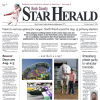There aren’t many days I dislike my job here at the Star Herald … especially when I see what else is out there, particularly in science.I almost started down the path of working in science, but I think it’s best I went into the writing business after seeing the list of some really bad scientific jobs, published by Popular Science. These jobs aren’t just a little bad — they are unbearably bad. They are unpleasant, even gross. But life is gross, and we know more about it because of scientists who study things we don’t think we’ll ever need to know. The world is a better place because of these scientists, although most of us wouldn’t apply for their jobs, even if we were on the verge of homelessness. I would gladly sacrifice the advanced degree or noble title for the likelihood that I’ll never have one of these jobs. …
Flatus odor judge. This is the study of people’s … you know. Subjects in this study ate pinto beans and their episodes of flatulence were inhaled and also chemically analyzed. The worst component in the flatus was hydrogen sulfide, which is good to know. The real purpose of the study was to get a window into gastrointestinal health. See? It’s worth studying.
Dysentery stool analyzer. Techlab is a company that tests the effectiveness of test kits that analyze loose stool from sick people. Apparently employees have a good sense of humor about the whole thing, with a motto: "Techlab: #1 in the #2 business."
Animal sperm extractor. This is to study fertility in various barnyard species. It’s an important field, but it ain’t pretty. There are four ways to extract the sperm, which I won’t elaborate on right now.
Brazil mosquito researcher. Scientists with this title study malaria and a particular Brazilian mosquito that spreads it. The researcher sets himself up in a netting tent with a gap at the bottom. The mosquitoes fly in and get trapped inside, where the researcher sacrifices his skin to science. When one lands on him, he draws it into a tube and puts it into a container, up to 500 in three hours. The risk is contracting malaria if one bites on.The scientists used to shave a guinea pig’s belly and let mosquitoes feed on it, but anti-cruelty protocols make it easier for them to show a little skin themselves.
Hot zone superintendent. These people clean Petri dishes and air filters that contain Ebola and anthrax when scientists work around an outbreak.oIsolation chamber tester. NASA has to study the psychological challenges astronauts face in long missions. One compared it to a car trip on a family vacation, except it’s one that lasts for months, and there are no rest stops. Crews in space recycle urine to turn into drinking water, which isn’t nearly as bad as being in such close quarters with people you don’t necessarily like.
Metric system advocate. They envision a future in which we’ll all buy decagrams of hamburger and buy liters of gas.
Fish counter. Mostly retirees, these people sit for eight-hour shifts and click a button for each fish they see. There are a couple different buttons for different breeds of fish just to keep them excited about their job.… Maybe it’s good that science wasn’t a part of my career choice. I can still say that I’m excited (and rarely disgusted) about my job. I don’t even need various clickers to get me through a long County Board meeting.
You must log in to continue reading. Log in or subscribe today.



